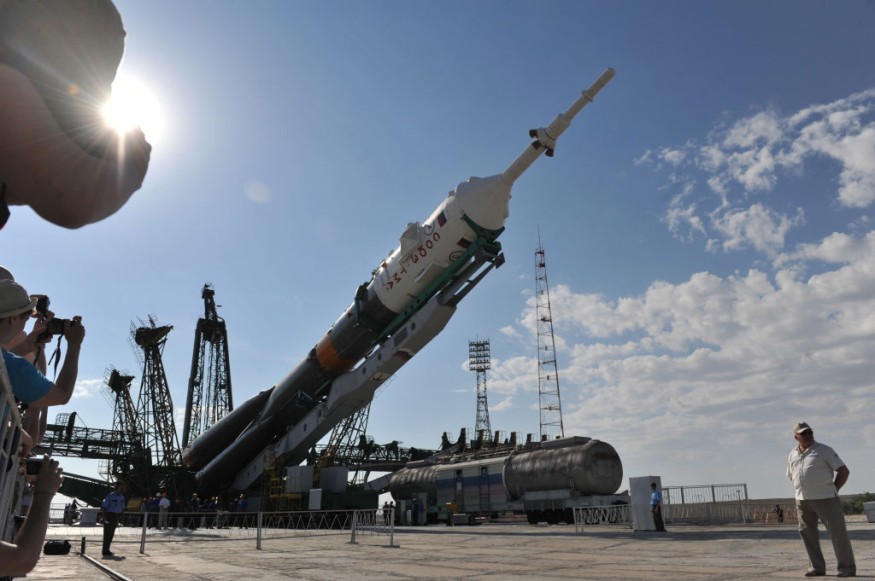Roscosmos has made another threat in reaction to international sanctions and said Russia would no longer provide rocket engines to the United States.
Although most rocket launches in the US should be unaffected, the decision may alter how cargo is delivered to the International Space Station (ISS).

A Russian Soyuz TMA-02M rocket is mounted at a launch pad in a Russian leased Kazakh Baikonur cosmodrome on June 5, 2011.
Russia to Stop Selling Rockets to United States
According to Tass, head of Roscosmos Dmitry Rogozin said they have decided to cease delivery of NPO Energomash rocket engines to the United States. Since the mid-1990s, these supplies have been continuous.
Reports added that the prohibition will also apply to RD-180 engines that power United Launch Alliance's (ULA) Atlas V rockets.
ULA's CEO, Tory Bruno, stated that it already has the RD-180s it requires soon.
He also stated that the consequences of the country's invasion of Ukraine would have no impact on ULA's activities.
I accelerated the delivery of the last RD180s. We have all that are required for the Atlas fly-out in hand, stored at the Rocket Factory in Decatur Alabama https://t.co/jKQHbUdepX
— Tory Bruno (@torybruno) February 25, 2022
ALSO READ : Roscosmos Threatens To Cancel OneWeb Internet Satellite Launch Friday, UK Officials Reject Ultimatum
ULA, a commercial space transportation business, is now in the process of retiring its Atlas rockets in favor of new Vulcan rockets.
The Vulcan will be powered by Blue Origin engines, a rocket firm founded by Jeff Bezos in the United States. However, it remains unknown when that rocket will be ready to fly.
According to CNN, the restriction also applies to RD-181 engines used on Northrop Grumman's Antares rockets. Uncrewed resupply flights to the International Space Station are powered by these rockets.
How Russia-Ukraine Crisis Affects ISS
According to reports, Russia's invasion of Ukraine may impact NASA's goal to extend the ISS's operational life. It's also possible that it might hasten its death.
Roscosmos said on March 2 that it only has permission to function for another two years.
The prospect of extending the agreement under the current circumstances makes them skeptical. The US sanctions, Roscosmos said, might jeopardize its collaboration with the International Space Station.
NASA and its other foreign partners might be severely harmed if Russia withdraws from the relationship.
It is because they rely on Moscow for key aspects of the ISS, such as resupply, power generation, and raising the station's altitude to keep it from colliding with Earth.
Current and former NASA and administration officials and academics believe that the other space station partners, such as the European, Canadian, and Japanese space agencies, could keep the ISS running without Russia. However, the expense and effort may not be justified.
If that happens, according to Brian Weeden, a space researcher with the Secure World Foundation, a lot of money will be needed.
NASA is publicly optimistic that the partnership, which stretches back more than two decades, would endure the new setback in the relationship with Moscow.
During a meeting with NASA's Advisory Council on March 2, NASA Administrator Bill Nelson stated that the US is committed to the seven astronauts and cosmonauts onboard the International Space Station.
Two Russians, four Americans, and a German from the European Space Agency make up the crew (ESA). Meanwhile, two NASA astronauts are finishing their Roscosmos training and three Russian cosmonauts are training with NASA.
On the other hand, five NASA astronauts will start training in Russia later this month.
Russia has previously considered breaking links with the International Space Station (ISS) in 2021, which Nelson believes might lead to a more serious space competition if Russia goes forward with it.
Check out more news and information on Space in Science Times.












